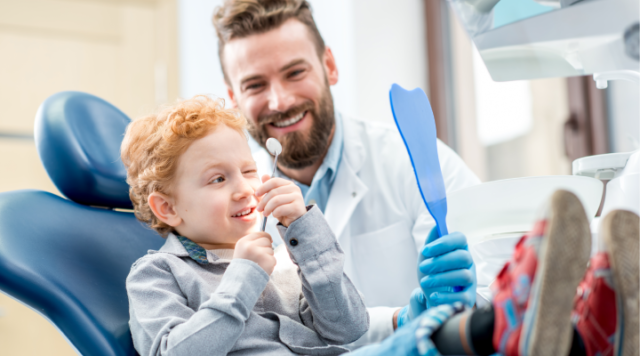
As a parent, you know that visits to the dentist play a critical role in maintaining your child’s oral health. That might be hard for kids to understand as they lie back in a weird office with a stranger standing over them and loud noises coming from every direction. Dental fears can lead to a delay in treatment and eventually poor oral health.
Here are ways to help if your child says, “I’m scared of the dentist!”
START EARLY
Your child should meet the dentist as soon as baby teeth come in, or by his or her first birthday. Starting early shows kids that dental visits are important in helping them keep their best smile. These visits also make your child more comfortable with the dental office when they come back for regular checkups as they get older.
CHOOSE A PEDIATRIC DENTIST
You might think it’s a better idea to choose a family provider, but finding a pediatric dentist for your child is a better option. After dental school, pediatric dentists take 2 to 3 years of specialty training to make them experts at treating kids, including young patients that say, “I’m scared of the dentist.” Their offices are also more likely to feature kid-friendly decorations and comfort toys.
WATCH YOUR WORDS
It may be tempting to give reassurance by saying, “It won’t hurt” or “It won’t be scary,” but those statements can actually give kids a feeling that they might have something to look out for. Explain that the dentist will use special tools to make sure their teeth are clean and healthy and things might get loud sometimes. You can tell your child that you visited the dentist, too, as a kid, but save the “war stories” that mention any negative experiences for your autobiography.
PACK PATIENCE & PAY ATTENTION
Don’t get mad or feel embarrassed by your child’s anxiety. Forcing them through the appointment by pinning their arms down, yelling or making threats can make the experience worse. Consider going into the exam room with your child. Kids older than 8 may not need the extra support, but for children who are younger, holding their hand or allowing them to sit on your lap during the exam can give them the comfort they need. If your child clams up or gets shy when the hygienist starts asking questions, they may need you to answer for them. But don’t be the parent who tries to take over the exam room. Trust the staff and know that they also want to make it through the appointment.
Need help finding a pediatric dentist? Click here.
